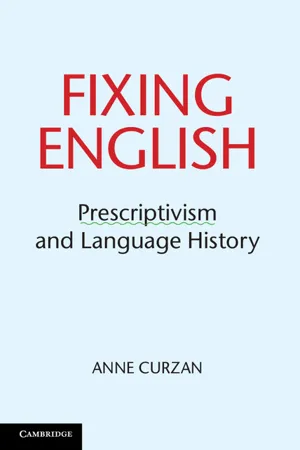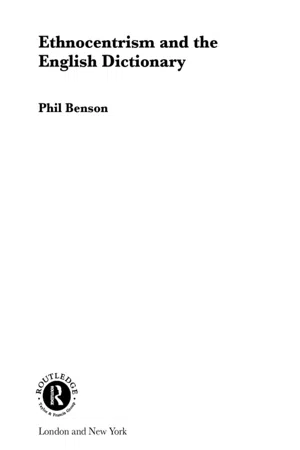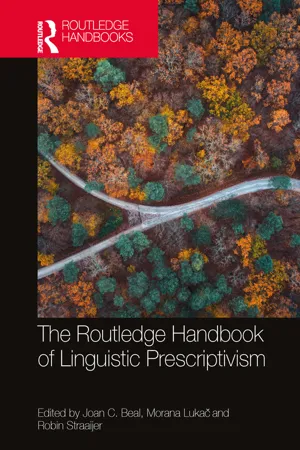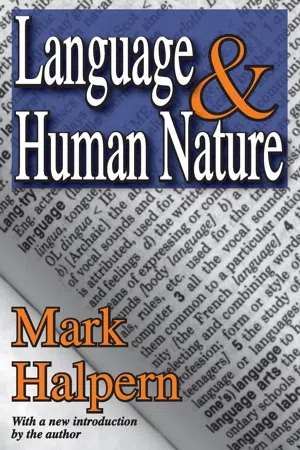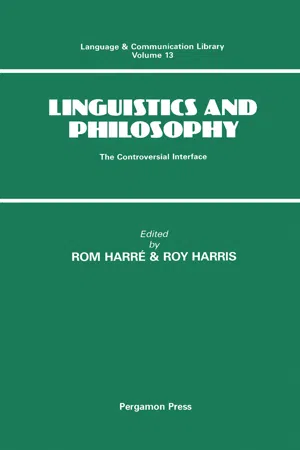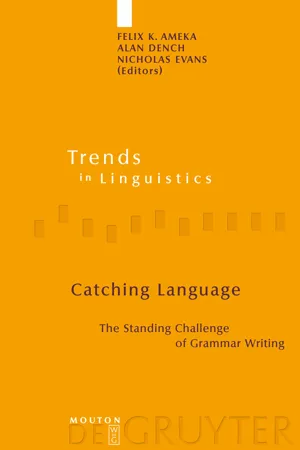Languages & Linguistics
Descriptivism
Descriptivism in linguistics is an approach that focuses on describing how language is actually used by its speakers, rather than prescribing how it should be used. It emphasizes the study of language as it naturally occurs in everyday communication, and seeks to understand and document the diverse forms and variations of language. This approach is often contrasted with prescriptivism, which emphasizes adherence to specific rules and norms in language usage.
Written by Perlego with AI-assistance
Related key terms
1 of 5
7 Key excerpts on "Descriptivism"
- eBook - PDF
Fixing English
Prescriptivism and Language History
- Anne Curzan(Author)
- 2014(Publication Date)
- Cambridge University Press(Publisher)
My hope is that this model, with some adaptation to the contextual 2 James Milroy and Lesley Milroy (1991) usefully distinguish between norms, which can function locally and often have not undergone standardization, and supra-local standards. As many scholars have pointed out, language and language communities are inherently normative. Individual versus institutional prescriptivism 17 circumstances, can be implemented across time periods and languages to create more shared and sustained dialogue about prescriptivism and its role in lan- guage history. Before turning to the primary challenge of defining prescriptivism along these lines, I first provide a brief discussion of Descriptivism – a reversal of the typical order in which prescriptivism is described first, as the foil for a more extended discussion of Descriptivism. Defining Descriptivism Descriptive approaches to language, which are typically set up in contrast to prescriptive ones, attempt to capture the range of ways that speakers of a language communicate with each other using systematically constructed, mean- ingful utterances. Linguists describe these utterances as “well-formed” because they follow the systematic patterns of the grammar of that variety of the language and speakers accept them as possible utterances, not because they necessarily correspond to the standard variety of that language. Descriptivism works from the assumption that all speakers of a language are speakers of a specific variety or dialect of the language (Wolfram 1991, 2); or, put differently, a “language,” which sounds unitary and uniform, is in reality a set of dialects collected together under this label (McWhorter 1998, 3). Descriptive approaches to language describe the patterns that surface in the structure of a language’ s words, sentences, and utterances, including all the variations in different dialects and registers. - eBook - ePub
- Phil Benson(Author)
- 2002(Publication Date)
- Routledge(Publisher)
The notion of the dictionary as representation implies a theory of the dictionary based upon theories of semiotics, ideology and discourse that will be outlined in more detail in Chapters 2 and 3. First, however, it has to be acknowledged that dictionary-makers themselves do not typically view lexicography as a process of representation. For most modern lexicographers, lexicography is first and foremost a process of description and the rules and principles of lexicographical practice constrain the lexicographer to ‘accuracy’ and ‘objectivity’. Moreover, twentieth-century descriptivist lexicography defines itself as a response to the prescriptivist lexicography of earlier centuries. In contrast to the prescriptive lexicographer, who relies on intuition and arbitrary diktat, the descriptive lexicographer relies on evidence. In this sense, Descriptivism is crucial to the self-image of modern lexicography as an endeavour in harmony with principles of scientific inquiry. We begin, therefore, by examining the nature of the assumptions on which descriptivist lexicography is based and their relationship to evolving theories of language.The descriptivist paradigm
Descriptivism has been described by Moon (1989) as the dominant paradigm for lexicography in the twentieth century. According to the descriptive principle the dictionary should tell the reader what the language is, not what it should be. The descriptive principle is also, in a sense, a moral one since it constrains lexicographers to record the ‘facts of the language’ accurately and without bias and without unjustifiably allowing their own opinions to come to the surface of the dictionary. It places the lexicographer above the interests of factions who might wish to use the dictionary as a site for linguistic or ideological dispute. At the same time it allows the lexicographer to submerge his or her own authority within the authority of the dictionary as an objective record of the language. Descriptivism also prescribes a set of procedures governing good practice, enshrined in manuals of lexicography (e.g., Zgusta, 1971; Landau, 1989), which define modern lexicography as a profession rather than an art.Descriptivism does not, however, define the dictionary as a form. Indeed, up until the mid-nineteenth century, dictionaries were, with few exceptions, compiled by individuals with interests and careers beyond the field of lexicography, who routinely inserted their own opinions about the meanings and value of words and the ideas to which they referred. In the late eighteenth century in particular, the authority of the English dictionary lay precisely in the authority of its compiler to tell the user how the language should be used. Descriptivism as a lexicographical principle first emerges in Archbishop Trench’s (1857) address to the Philological Society, now taken to mark the origins of the OED, in which he proposed that the dictionary should be ‘an inventory of the language’ and the lexicographer ‘an historian … not a critic’. These succinct definitions of the dictionary and the lexicographer’s role in its compilation would eventually come to stand for the ideal of descriptive lexicography. Simpson (1990: 1961), coeditor of the second edition of the OED, has described Trench's address as a ‘manifesto for dictionary-makers’ and Gates (1992: 268) has described the OED - Joan C. Beal, Morana Lukač, Robin Straaijer, Joan C. Beal, Robin Straaijer, Morana Lukač(Authors)
- 2023(Publication Date)
- Routledge(Publisher)
In other words, linguistics … is descriptive, not prescriptive (or normative)” (1968, p. 43). A very similar section can be found 33 years later in Justice (2001). The first chapter, entitled “What is Linguistics,” includes a section on “prescriptivism vs Descriptivism”, in which Justice writes: “rather than prescribe to students how they should speak a language, linguistics is mainly concerned with describing how people actually speak” and “what you will soon see, hopefully, is that prescriptivism ignores reality” (2001, p. 5). We even find similar statements in one of the latest introductory textbooks to the history of English. In their chapter on late modern English, Hejná and Walkden (2022) write “[p]rescriptivism is in opposition to Descriptivism”, and “[l]inguistic research as carried out in academia is descriptive, not prescriptive” (p. 62). 3. The growing body of research on linguistic prescriptivism The growing interest in linguistic prescriptivism has been marked most notably by a recent proliferation of research on the topic, as well as by the organisation of six consecutive international conferences on prescriptivism during these first decades of this century. 5 Several collections that comprehensively contrast case studies focusing on prescriptivism (first only with respect to English, and later also across other languages) arose from this series of international conferences on prescriptivism, and we will briefly discuss them here. The conferences (or colloquia, as the earlier ones were humbly called) started from a desire to explore alternative approaches to the study of English as well as the nature of prescriptivism in its own right- eBook - PDF
- Matthew J. Gordon(Author)
- 2012(Publication Date)
- Bloomsbury Academic(Publisher)
Most nonlinguists view language through an evaluative lens. This is especially evident in discussions of usages associated with regional and social dialects, which are the focus of Labov’s research. The contrast is often framed as pitting the “descriptive” approach of the linguists against the “prescriptive” approach of, well, everyone LINGUISTICS AND SOCIOLINGUISTICS BEFORE LABOV 23 else. Linguists describe how language is used while others prescribe how language should be used. Linguists encounter a phenomenon like “copula deletion” in which the verb be is omitted (e.g. The coffee cold ; She running ) and try to document the circumstances that permit such deletion, the factors that determine how likely the verb will be deleted in a given situation, and the history of this grammatical feature. A prescriptivist encountering this same phenomenon would dismiss it as “bad” grammar and likely the product of laziness. The fact that copula deletion is rule-governed and even conveys shades of meaning distinct from comparable mainstream usages is irrelevant to a prescriptivist, who simply views it as a problem to be fixed. Prescriptivism reigns as the dominant view in the US, UK, and other societies with an acknowledged standard language. The educational system, the media, and other institutions in these societies promulgate the idea that the variety known as the standard is superior to others. This standard is perceived as more logical, more precise, clearer, and even more beautiful than nonstandard dialects. The prescriptivist attitude is obviously something that linguists must contend with. This is especially true for a linguist like Labov who focuses on varieties of English that are considered nonstandard. As we’ll see in the next chapter and elsewhere, Labov developed techniques for exploring popular attitudes about language directly and for managing the effects of such attitudes on the speech data he was seeking. - eBook - ePub
- Mark Halpern(Author)
- 2017(Publication Date)
- Routledge(Publisher)
CHAPTER 4 Descriptivist, Prescriptivist, and Linguistic ActivistThe descriptivist claims summarized, with a Linguistic Activist’s replies
For a great many years — a handy starting point might be 1906, when H. W. and F. G. Fowler’s The Kings English first appeared — a battle has been going on in the English-speaking world between those interested in guiding language usage and those interested in recording it. The former have come to be called the prescriptivists, the latter the descriptivists. The prescriptivists are usually highly educated and literate, trained in the humanities, and often temperamentally conservative; the descriptivists are usually academic linguists and lexicographers, trained in linguistics or one of the social sciences, and temperamentally “progressive.” Both parties, of course, are small minorities; the great majority of the public is very little interested in thinking about language, whether in order to improve it as an instrument of communication or investigate it as a scientific subject. The conflict between the two parties has nevertheless almost always taken the form of appeals to that largely uncaring public rather than direct confrontation between the combatants: the prescriptivists write letters to the editors of the more serious newspapers and magazines, lamenting the latest evidence of illiteracy, and pointing to failures in our education system; the descriptivists write pieces for the same periodicals pointing out the mistakes in linguistic history committed by the prescriptivists in their letters, and lamenting their general ignorance of linguistic science.These forays into print seem to have had little effect except that of relieving the feelings of the writers; I know of no case in which any prescriptivist or descriptivist has been convinced of the error of his ways, nor of any member of the general public who has been persuaded by either party to regard the issues as critical and deserving of much of his attention. Nevertheless, I propose now to join the battle, and hope to achieve a little more than just the relieving of my personal anxieties (when I feel violated by some abuse of language, I just lie back and think of English). I begin by declaring where my sympathies lie: I am by temperament and training a writer and editor; my interest in language is that of a user, and I feel much closer to the prescriptivists than the descriptivists. But I do not identify completely with the prescriptivists; I find that in too many cases their initial reaction, at least, to any neologism makes them seem as blindly opposed to change as the descriptivists are in favor of it, and they do not always take the trouble to think through their opposition to various bêtes noires, - eBook - PDF
Linguistics and Philosophy
The Controversial Interface
- R. Harré, R. Harris(Authors)
- 2017(Publication Date)
- Pergamon(Publisher)
Any linguist who maintains a distinction between so-called 'formal' and 'substantive' universals falls into this category, and by implication uses the terms 'theory' and 'description' in a sense that is incompatible with the sense in which I use these terms. This is not to say that my distinction is the best one for all sciences, or even for all approaches to linguistics. Its superiority or otherwise has very much to do with the intended scope of the approach, and with the nature of that which one wishes to account for. The scope of the present approach is limited to the description of communicative phenomena as they can be ascertained by observation. That which we wish to account for comes under the general heading of 'observables'— 'the speech phenomena' in this case—which already satisfies one of the criteria for effectively being able to use falsificationism as a method, but Negativism as an effective methodology in linguistic description 181 what we as functionalists are crucially interested in is the 'functional communicative aspect' of those speech phenomena. This may seem rather limiting at first sight, but at least quantitatively speaking it is not less, and frequently even more, than most other approaches have managed to embrace. Note also that most other sciences, when using a unified theory, also severely limit the aspects under which they deal with their fields of investigation. Our choice of aspect implies that our approach is empirically orientated, though not empirically based, and it means that we operate within the continental European tradition of Saussure ('Dans la langue il n'y a que des differences'), Troubetzkoy, and Martinet ('Function is the criterion of linguistic reality'). Of non-European or non-continental linguists, in this respect at least, a somewhat similar approach can be seen in works by Charles Hockett, Michael Halliday, and perhaps also the so-called 'Stratificationalists', especially Sidney Lamb, the founder of that approach. - eBook - PDF
Catching Language
The Standing Challenge of Grammar Writing
- Felix K. Ameka, Alan Dench, Nicholas Evans, Felix K. Ameka, Alan Dench, Nicholas Evans(Authors)
- 2008(Publication Date)
- De Gruyter Mouton(Publisher)
There are various other respects in which I believe much descriptive work paints a distorted view of language. For example, grammatical descriptions tend to concentrate on regularities and to play down lexical idiosyncracies and lexicalized grammatical constructions. I believe that word classes in particular languages are often Descriptive theories and explanatory theories 227 not as well-motivated as descriptions sometimes suggest, and that word class systems are often highly complex. But again, I view these not as criticisms of basic linguistic theory, but simply as criticisms within basic linguistic theory of applications of the theory. 10 The improvements in basic linguistic theory over the past twenty-five years have not been prompted by specific attempts to improve it, since most linguists have failed to recognize its status as a theoretical framework. Developments have been the side effect of work in typology, and there is every reason to believe that further developments will continue in coming decades, both because of work in typology and quite possibly from new ideas from some other quarter. However, further improvements might develop if more functional, typological, or descriptive linguists recognized the status of basic linguistic theory as a theory, and addressed the question: how could we make the descriptive grammars we are writing even better than they are now? 8. Conclusion I have argued here that the emergence of basic linguistic theory as the dominant theoretical framework for describing languages is something that has happened despite the widespread failure of linguists to recognize its status as a theoretical framework. There are many ways, however, in which the field has suffered from this failure to recognize basic linguistic theory as a theoretical framework and to recognize the need for both descriptive theories and explanatory theories.
Index pages curate the most relevant extracts from our library of academic textbooks. They’ve been created using an in-house natural language model (NLM), each adding context and meaning to key research topics.
